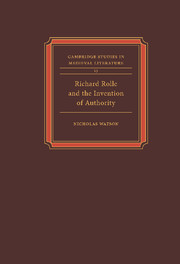Book contents
- Frontmatter
- Contents
- Preface
- List of abbreviations
- Introduction: Contexts: three preliminary essays
- PART I
- PART II
- PART III
- 5 Contemplative life, Fervor: Incendium Amoris
- 6 Contemplative life, Dulcor: Super Psalmum Vicesimum, Super Canticum Canticorum, Contra Amatores Mundi
- 7 Contemplative life, Canor: Melos Amoris
- PART IV
- Epilogue: Rolle as a late medieval Auctor
- Excursus I: The chronology of Rolle's writings
- Excursus II: Rolle's reading and the reliability of the Officium
- Notes
- Bibliography
- Index
7 - Contemplative life, Canor: Melos Amoris
Published online by Cambridge University Press: 04 December 2009
- Frontmatter
- Contents
- Preface
- List of abbreviations
- Introduction: Contexts: three preliminary essays
- PART I
- PART II
- PART III
- 5 Contemplative life, Fervor: Incendium Amoris
- 6 Contemplative life, Dulcor: Super Psalmum Vicesimum, Super Canticum Canticorum, Contra Amatores Mundi
- 7 Contemplative life, Canor: Melos Amoris
- PART IV
- Epilogue: Rolle as a late medieval Auctor
- Excursus I: The chronology of Rolle's writings
- Excursus II: Rolle's reading and the reliability of the Officium
- Notes
- Bibliography
- Index
Summary
As Rolle approached the writing of Melos Amoris, perhaps during the mid-1340s (see Excursus 1), he must have felt that he was reaching the climax of his career as an auctor. The hard labour of establishing the importance of his chosen materia, and of resolving in a satisfactory way the awkward relationship between extolling it and extolling himself, had been more or less completed by the end of Incendium Amoris. The secondary but still vital tasks of defining the full significance of canor, as a continual enjoyment of God which guarantees the spiritual security of its recipient, and then of defending that definition against the major auctoritates of the mystical life (the ‘plurimi sanctorum’), had also been accomplished: first on a small scale in Super Psalmum Vicesimum, then in audaciously extended form in Super Canticum Canticorum and Contra Amatores Mundi. What had begun as an almost insuperable problem of persuading readers that his unique experiences were real and God-given had become a rich opportunity to exult in the greatness of the gifts that had been bestowed on him, with a divinely inspired eloquence that was itself one of those gifts and which could not fail to convince. The way forward was clear. The crowning stage in the long process of revelation must be a celebration of canor, matching but also transcending all he had written from the perspectives of fervor and dulcor: a work, then, which would cover much of the same ground, but in a manner that would reveal yet more of the archana Dei known only to the perfectissimi, and in a style of unimagined grandeur.
- Type
- Chapter
- Information
- Richard Rolle and the Invention of Authority , pp. 171 - 192Publisher: Cambridge University PressPrint publication year: 1991



